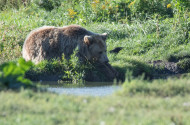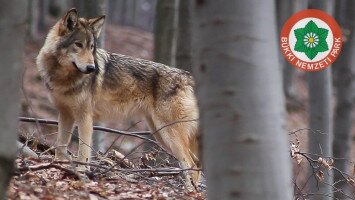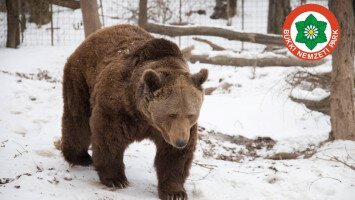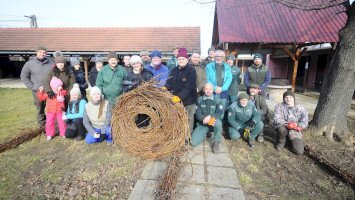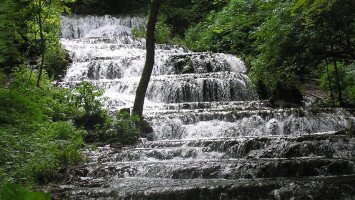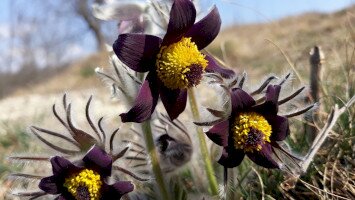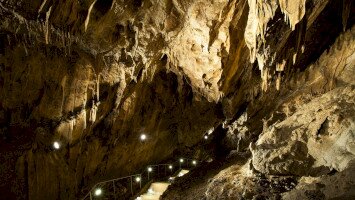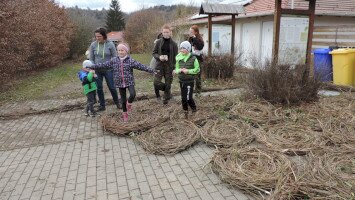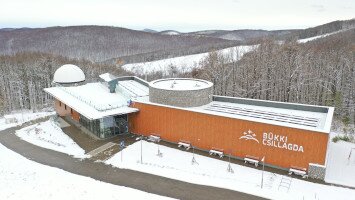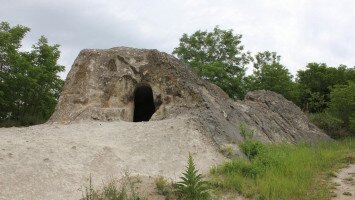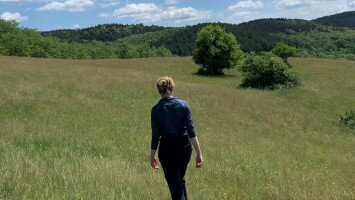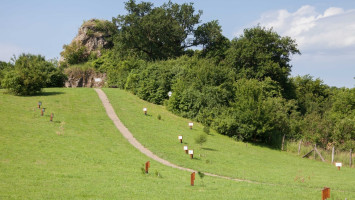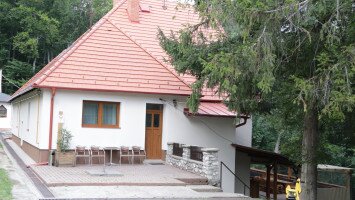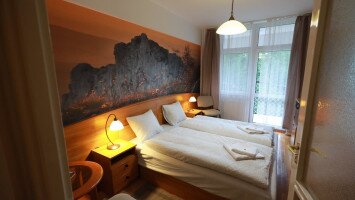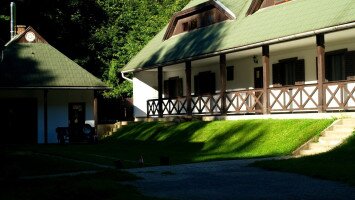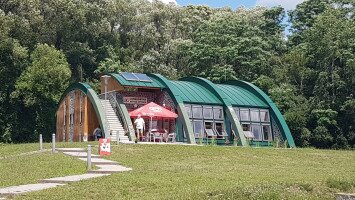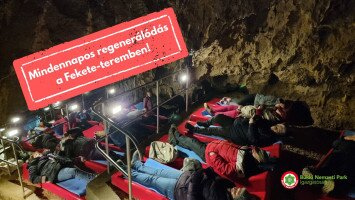
Press release about recent bear sightings 05/13/2023 11:28 AM
Due to the increase in the Carpathian brown bear (Ursus arctos) population and the changes in their habitats in recent years, we have been detecting more and more often signs of brown bears in the Bükk National Park Directorate's operational area. The range of the Carpathian bear population has reached the limits of the species' native habitats.
Some individuals in our country sometimes travel long distances, as was shown a few years ago by the documented migration of the tagged specimen "Iwo" in 2015. The specimen marked in the Polish Tatras did not travel long distances from its original habitat for almost a year, then reached our country within a few weeks and continued to Ukraine. Most brown bears remain relatively inconspicuous during their longer or shorter stays.
However, during this year's wetter spring, footprints of visiting individuals have been found in several places on the wet ground, and camera traps operating around the clock have recorded some sightings. In the past year, we have witnessed an interesting change. Already last October, we reported that an adult male living here since May of the previous year had most likely overwintered in the Bükk and has been here ever since. This specimen can be clearly identified by its distinctive colouration. It is regularly observed, typically moving east-west through the Bükk.
Clearings in the forest caused by logging and the acorn found in older forests in the country provide abundant food sources for omnivorous bears. Another likely contributory factor to the species' distribution is that the now severely decreased wild boar population does not consume the available food supply, which provides an attractive table setting for bears. A few years ago, an adult female was identified in our area of operation.
The presence of large predators alone does not lead to conflict situations. Male bears in the Bükk sometimes feed within 50 m of grazing cattle, where the protection of the grazing livestock is partly supported by the electric fence provided by the Bükk National Park Directorate. We have drawn local farmers' attention to the presence of bears and ways to prevent potentially dangerous situations.
The problem for farmers can also be caused by the unintentional feeding of brown bears, such as access to waste bins or the spreading of agricultural crops, especially food no longer suitable for human consumption, in the forest for feeding purposes, as the lure of food can reduce the bears' natural fear of humans. Experience has shown that the practice of 'feeding' is common in neighbouring countries (e.g. Slovakia, Romania, Slovenia, Poland) and can lead to undesirable conflict chains. We, therefore, call on all social groups to respect responsible farming behaviour.
We also thank the public for their reports and photos of bear sightings, which can be sent to our main contact address (titkarsag@bnpi.hu) with specific locations.
By submitting your observations, you are helping to map the movements of the individuals. More information can be found on our website here: https://www.bnpi.hu/hu/hir/viselkedesi-szabalyok-m...
BEHAVIOURAL CHECKLIST FOR ENCOUNTERS WITH A BEAR
Bears are no toys. Bears should be avoided at any time. Bears should not be befriended, no matter how old they are. The mother is usually close to her cubs. Most conflicts are caused by mother bears. If you see a bear, please report it to our management under the emergency number +36 30 861-3808.
FOR HIKERS
- When you go into the forest, enter it only on the designated hiking trails!
- Avoid impassable thickets and undergrowth!
- If not necessary, do not enter the forest between sunset and sunrise!
- Make it clear to the bear that you are approaching: Make noises and do not sneak up on them!
- Chat with each other when you are in a company!
- Use a noisy device when you are alone: a bell or a radio, for example.
- Do not use headphones!
- If you encounter a bear and the bear has not noticed you, quietly move away from the spot, keep an eye on the bear and move back.
- The bear stands on two legs to orient itself better.
- If the bear sees you, do not try to scare it away!
- Do not look it in the eye!
- Do not turn your back to it!
- Do not try to run away! The bear is faster than you.
- If you encounter the bear while sitting in a car, do not leave it, but stay in it!
- Do not feed it!
- Do not try to photograph it from up close (e.g. selfie)!
- If the bear approaches do not provoke it or make any sudden movements!
- When walking or hunting with a dog, remember that the dog fleeing from the bear will run back to its owner for shelter while the attacking bear pursues it.
- Do not take any strong-smelling food with you!
- Do not take any canned fish or sweetened condensed milk!
- Do not leave any leftover food or its packaging behind!
- Pack the leftovers in odourless packaging and take them with you if possible!
- When camping, hang your food on a tree far from the tent.
- Cycling in the forest increases the risk of surprise encounters!
FOR LOCAL RESIDENTS
- Stop putting garden and kitchen waste outside your fence!
- Do not throw food waste on the compost pile!
- Wait to put out the rubbish bin until the day of its collection!
- Keep livestock in the barn overnight!
- Do not place beehives on the edge of the forest!
- Use well-trained, large dogs!
FOR FARMERS
The likelihood of bears visiting is high when farms are close to the forest edge. Experiences from abroad indicate that the damage potential is lower than 500 metres from the forest line.
- Use a multi-fibre (preferably 6-fibre) light pole with a 5000-8000 V voltage. The top strand should be 120 cm high!
- Build a solid fence around the property with a retractable roof!
- Use methods to deter wild animals!
- Keep livestock indoors overnight!
- Do not place beehives on the edge of the forest!
- Use well-trained, large dogs!
If you see a bear, please report it to our administration under the following emergency number: +36 30 861-3808
